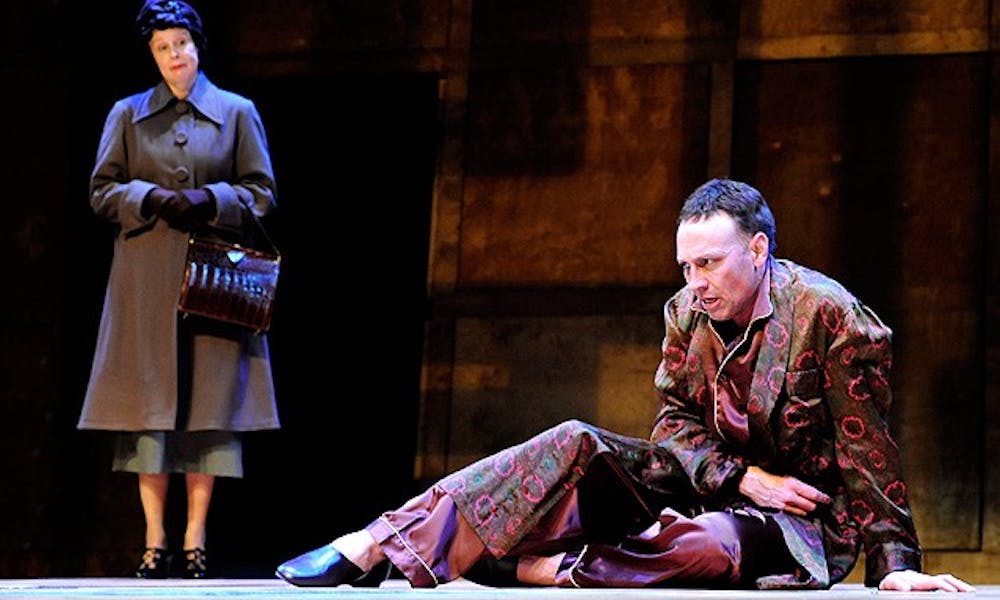Tony Kushner’s Pulitzer Prize-winning Angels in America soars under the able direction of Brendon Fox.
Performed by PlayMakers Repertory Company at the University of North Carolina at Chapel Hill, the two-part play spans seven hours and explores the tragedy of AIDS in Reagan-era America. “Part One: Millennium Approaches” runs slow at times, the momentum occasionally disrupted by Kushner’s verbosely philosophical dialogue. “Part Two: Perestroika,” however, surges to emotional heights. Angels in America has previously been likened to a modern-day Shakespearean tragedy; much like the Bard, Kushner artfully weaves zingy one-liners between poetic language and reflections on the heartbreak and struggles of the human experience.
Angels revolves around two couples, one gay and one (seemingly) straight. In “Millennium Approaches,” characters are at a crossroads and relationships are crumbling. Louis, a neurotic, liberal Jew prone to pretentious intellectualizing, can’t handle the news that his boyfriend Prior has AIDS. After Louis leaves him, the ailing Prior is visited by his dead ancestors and a sexual angel with a booming voice who reveals in “Perestroika” that Prior is, in fact, a prophet.
In the meantime, married Mormons Joe and Harper are battling Harper’s Valium-induced hallucinations and Joe’s closeted homosexuality. Angels also depicts a fictionalized version of Roy Cohn, the real-life New Yorker and power broker who aided Joseph McCarthy in his anti-Communist crusades and who eventually died of AIDS.
As the characters’ lives become interwoven through a series of coincidences and supernatural occurrences—Harper and Prior first meet when their respective hallucinations and dreams converge—they are forced to question religion, politics, sexual identity, love and personal responsibility. Despite the heaviness of the play’s themes and the fact that each of the main characters is wrought with emotional or physical turmoil, frequent moments of levity and laugh-out-loud humor keep the characters’ metaphysical philosophizing from lagging too much.
Several actors who make up Angel’s eight-person ensemble play multiple roles, adding to the dreamlike interconnectedness of the characters’ lives. PlayMakers veteran Julie Fishell is particularly remarkable, crossing gender lines to play a rabbi, Roy Cohn’s doctor, real-life executed Communist Ethel Rosenberg and Joe’s strong and dynamic mother Hannah, who moves from Salt Lake City to New York at the end of “Millennium” when she learns her son is gay.
The thrust stage of the Paul Green Theatre adds to the creation of a beautiful and deceptively minimalistic set that shifts action from New York to Utah to heaven itself. Floor lights flood through wooden panels to transform the stage into the ethereal land where the eponymous angels live, and a rippling white sheet morphs the stage into the snowy landscape of Antarctica dreamt up by pill-addled Harper’s mind.
Despite the fact that Kushner’s characters are deeply flawed people, the cast’s nuanced performances and Kushner’s brilliant script prevent them from becoming one-dimensional. The characters grow and evolve throughout the achingly moving, funny and sad theatrical journey. “Perestroika” ends on an optimistic note about progress and forgiveness, sending last Sunday’s audience leaping to their feet.
PlayMakers’ Artistic Director Joseph Haj, who worked on one of the first regional productions of Angels in America in 1996, rightly calls “Millennium Approaches” and “Perestroika” “the most progressive and beautifully written plays that the modern theatre has to offer.” Although rooted in a particular moment in history, PlayMakers’ production of Angels in America is no less relevant and impactful today.
Angels in America’s “Millennium Approaches” and “Perestroika” will run on a rotating schedule through March 6 at PlayMakers’ Paul Green Theatre at the University of North Carolina at Chapel Hill. Visit www.playmakersrep.org for tickets and performance times.
Get The Chronicle straight to your inbox
Signup for our weekly newsletter. Cancel at any time.

